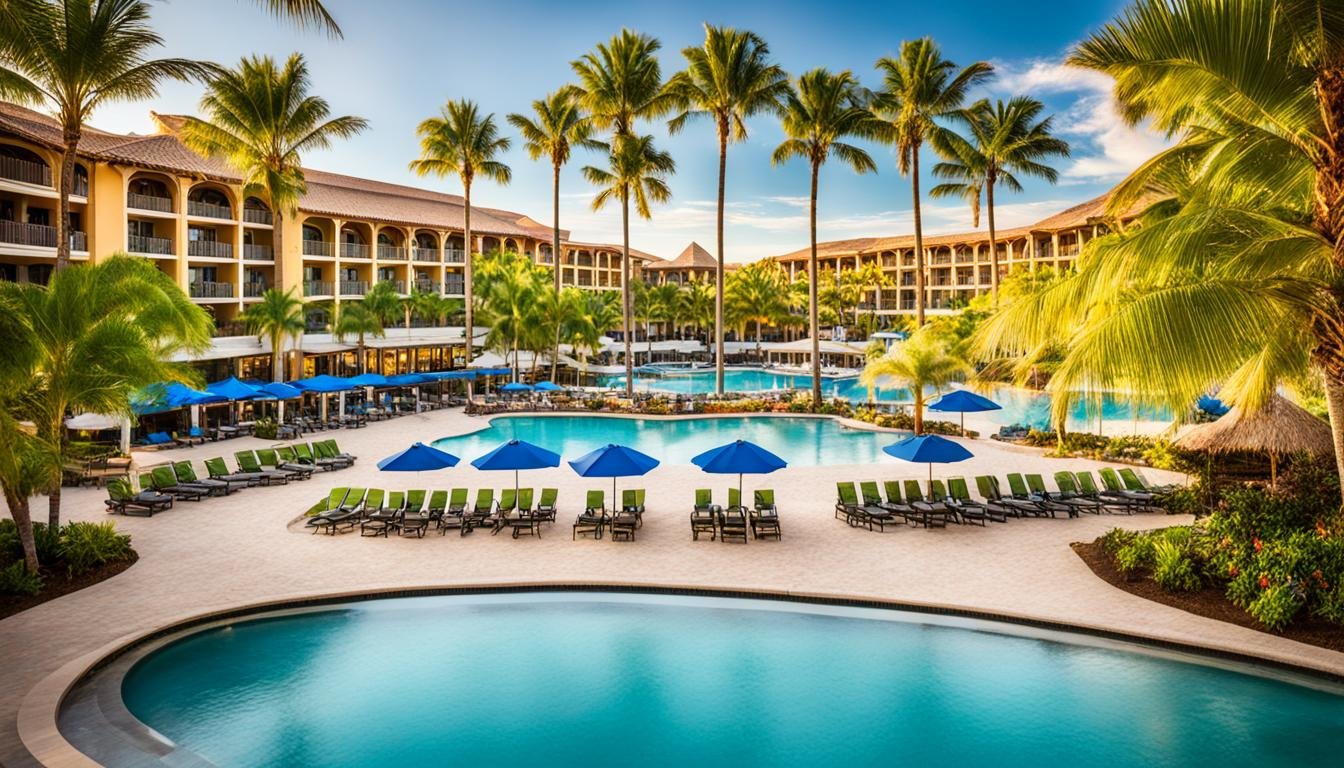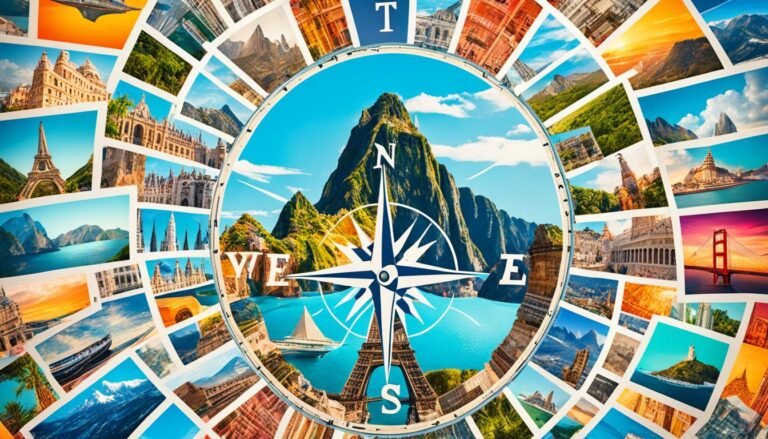Resort Management 101: Essential Tips & Skills
Welcome to the exciting world of resort management! If you dream of working in the hospitality sector or are just curious, you’re in the right place. This article gives you a peek into the inner workings of resorts, their management, and the big picture of the hospitality industry.
Picture this: you’re walking through a lively resort. The sun’s warmth feels good on your skin, and the sea breeze fills the air with freshness. Around you, there’s green everywhere, incredible views, and the joyous laughter of vacationers.
Your journey brings you to a chic poolside cabana. There, the resort’s manager, Sarah, gives you a warm greeting. She makes sure everything about your stay is just right, from checking in to the luxuries offered. Her care and making each guest’s stay special shows how important her role is in resort management.
In this field, managing resorts means being in charge of everything. From where guests sleep to how they have fun, eat, and relax, it’s all about crafting an amazing experience.
This article takes you through resort history, the part technology plays today, and what it takes to be a great resort manager. We’ll get into details about managing a resort well, what to do, and what not to do. And, we’ll look at the special aspects of running a hotel.
So, get ready with your beach towel and join us. Let’s explore the fascinating universe of resort management!
Key Takeaways:
- Resort management involves overseeing various aspects of a lodging facility’s operations, accommodations, recreation, entertainment, and food services.
- The history of resorts dates back to ancient times, evolving into the destination-focused, all-inclusive experiences seen today.
- Technology plays a crucial role in modern resort management, enabling predictive maintenance, smart energy management, big data utilization, and remote check-in/check-out services.
- Key aspects of resort management include lodging operations, recreational facilities, food services, human resources, and guest services.
- Successful resort management requires adherence to best practices, such as guest feedback, staff training, clear policies, problem-solving, open communication, budget management, technology adoption, risk management, staff motivation, and industry awareness.
The Origins and Evolution of Resorts
Resorts have been around since ancient times, offering luxury and fun for guests. Their purpose has changed a lot. Nowadays, resorts offer much more than just a comfortable place to stay.
Resort History:
The idea of resorts started with the Roman Baths in 2nd Century BC. These baths had separate areas for men and women. People came not only to relax but also to socialize and get better.
European Resorts:
In Europe, resorts have long been about health and wellness. Places that helped you rest, rejuvenate, and even get medical treatments were popular. People visited these serene spots to enjoy nature and heal.
North American Resorts:
In the 1800s, North American resorts became a trend for the well-off. They offered activities like hiking and fishing. These resorts were a peaceful escape from the busy city life.
Future of Resorts:
The future of resorts is in their unique offerings. They will focus on delivering unforgettable experiences. With travelers’ needs changing, resorts will employ skilled professionals to ensure every guest’s satisfaction.
To truly understand resorts, we must know about the Roman Baths, European wellness retreats, and North American outdoor escapes. By knowing the past and planning for the future, resort managers can make the industry better.
The Role of Technology in Resort Management
Technology is key for resort management companies to succeed. As the world of travel changes, resorts need tech to keep up. This helps them meet guest needs in a digital age and stay ahead of the competition.
Technological innovations like predictive maintenance, smart energy use, and big data have changed how resorts work.
Predictive Maintenance
“Predictive maintenance helps keep everything running smoothly, avoiding breakdowns. It uses smart systems to spot and fix problems early. This cuts downtime and makes things run better for guests.”
Smart Energy Management
“Resorts can save money and the planet with smart energy systems. They find and fix energy waste, cutting costs. This helps resorts be more eco-friendly and efficient.”
Big Data Utilization
“Big data gives resorts info to make smarter choices and please guests more. They use data on what guests want and do to offer better services. This means personalized marketing and better guest satisfaction.”
Remote Check-In/Check-Out Services
“Digital check-in and out make things easier for guests. With mobile apps and kiosks, guests can skip lines. This makes everyone happier.”
By using new tech, resorts can work better, use resources smarter, and make guests super happy. It’s vital for resorts to keep up with tech trends and invest in tech that fits their goals.
| Technology | Benefits |
|---|---|
| Predictive Maintenance | Proactive equipment maintenance, reduced downtime, improved operational efficiency |
| Smart Energy Management | Optimized energy consumption, cost reduction, enhanced sustainability |
| Big Data Utilization | Data-driven decision-making, personalized guest experiences, improved satisfaction |
| Remote Check-In/Check-Out Services | Convenience, flexibility, streamlined guest experience |
Technology plays a crucial role in the success of resort management companies.
Key Aspects of Resort Management
Resort management covers many important parts that make a resort successful. This includes being in charge, the place’s goals, where guests sleep, fun activities, food, people who work there, and taking care of the guests. They all work together to give visitors a great time.
Resort Leadership: Defining the Vision and Mission
At the start, owners and top leaders set the resort’s vision and mission together. This direction guides everything in the resort, from how they make choices to ensuring guests have a great time. The goals in the vision and mission help the resort know where it’s going and why.
Lodging Operations: Providing Exceptional Guest Experiences
The heart of a resort’s job is making where guests sleep and stay perfect. This means making sure check-in, rooms, and any help guests need are all top-notch. A smooth and enjoyable stay is the goal from the very first moment to the last.
Recreational Facilities: Enhancing Guest Engagement
Fun places like pools, gyms, spas, and outside spots are big reasons guests choose a resort. The resort has to have the right people and equipment to make sure guests’ free time is amazing. This part is all about giving guests great ways to have fun and relax.
Food Services: Catering to Culinary Delights
Food is a key part of the resort experience, and managers make sure it’s perfect. They organize where guests eat, what they eat, and if they want food in their room. Making sure guests love what they eat makes their stay unforgettable.
Human Resources: Supporting the Resort Team
The team that works at a resort is the most important part, and HR helps keep it great. They find and train people who love to help guests. HR also offers ways for resort staff to get better at their jobs and grow in their careers.
Guest Services: Ensuring a Positive Experience
Members of the guest services team are always ready to help guests and make them happy. They provide info, fix problems, and make sure everything runs smoothly for guests’ visits. Their goal is to leave every guest with great memories.
Managers handle these areas to make sure guests have a wonderful time. This makes guests happy and the resort well known for its great service.
| Key Aspects | Description |
|---|---|
| Resort Leadership | Ownership and executive team define the resort’s vision and mission |
| Lodging Operations | Manage guest check-ins/outs, concierge services, and housekeeping |
| Recreational Facilities | Hire, train, and maintain staff and equipment for engaging recreational experiences |
| Food Services | Food and beverage managers oversee restaurant, catering, and room service operations |
| Human Resources | Support hiring, employee development, and promotion within the resort |
| Guest Services | Assist guests and ensure a positive experience during their stay |
Dos and Don’ts of Resort Management
Running a successful resort needs you to follow the best steps. This keeps guests happy and helps the resort do well. Here’s a guide on what to do and not to do:
1. Encourage and Listen to Guest Feedback
Having guests share their thoughts is key to making the resort better. Always ask for feedback and really listen. Respond to their needs and ideas to improve their visit.
2. Prioritize Staff Training
Training staff well leads to happy guests coming back. Teach your team about service and other skills they need. Keep their knowledge fresh with new training on what’s new and best for the resort.
3. Implement Clear Policies and Procedures
Rules and steps for daily work keep your place running smoothly. Update these to keep up with what guests want and what’s new.
4. Proactively Address Problems
Looking ahead and fixing issues early is a must. Use regular check-ups and guest feedback to spot and fix problems. Encourage your team to come up with new ideas to solve things too.
5. Maintain Open Communication Between Departments
Keep everyone talking and working together for a great guest experience. Make sure different parts of the resort share info and work together. Have regular ways for them to talk, like meetings or using a special app.
6. Efficient Budget Management
Money matters, and managing it well is key. Find ways to save while keeping guests happy. Look at the budget often to see where to spend less or use money better.
7. Leverage Technology for Improved Operations
Use tech to make things run smoother. Apps for booking, systems for managing, and tools for better service help a lot. Stay on top of new tech so your resort stays ahead in the game.
8. Implement Risk Management Strategies
Being ready for problems is important. Know what could go wrong, make plans, and check these plans often. This keeps things safe and running well.
9. Ensure Staff Motivation
Happy staff means happy guests. Praise them, help them grow, and remind them they’re key to the resort’s success. When they feel good about their work, they do great things for the guests.
By doing what’s right and avoiding what’s wrong, resort managers can make their guests’ stay great. This leads to happier guests and a more successful resort.
| Dos | Don’ts |
|---|---|
| Encourage and listen to guest feedback | Ignore or dismiss guest feedback |
| Prioritize staff training | Neglect staff training and development |
| Implement clear policies and procedures | Have ambiguous or outdated policies and procedures |
| Proactively address problems | React to problems only after they escalate |
| Maintain open communication between departments | Have silos and lack of collaboration between departments |
| Efficient budget management | Overspend and mismanage the budget |
| Leverage technology for improved operations | Ignore technological advancements and rely on outdated systems |
| Implement risk management strategies | Overlook potential risks and fail to plan for contingencies |
| Ensure staff motivation | Disregard staff morale and motivation |
What is Hotel Operations Management?
Hotel operations management ensures a great experience for guests. It includes daily tasks that keep the hotel running well. The manager has to handle staff schedules, make sure everyone follows hotel rules, and work with departments like housekeeping and food service. They also look after the money to make sure everything works smoothly.
Their role is vital for keeping the hotel’s service and hospitality top-notch. They make sure everything, from check-in to room preparations, runs without a hitch. This means working closely with the staff from many departments to meet guests’ needs and go beyond their expectations.
“Hotel operations management is the backbone of a successful hotel, ensuring that guests have a memorable and enjoyable experience from the moment they arrive to the moment they depart.”
These managers also make sure the hotel follows all the rules and is up to standard. They keep communication open between departments to solve any issues quickly. This way, they help make guests happy by handling their concerns and ensuring their satisfaction.
Managing the budget is another key part of their job. They decide where the money goes, keep track of the expenses, and try to save without lowering the quality of service. This keeps the hotel running smoothly and making a profit.
In smaller hotels, the manager may do more than just operations. They could also manage things like marketing and the budget. But whether it’s a big hotel or a small one, operations management is essential for a great guest stay.
The Role of Hotel Operations Management
They are in charge of:
- Coordinating when everyone works to make sure the hotel is always ready
- Making sure hotel rules are followed and keeping up with industry standards
- Working with different departments to meet guest needs
- Deciding where the money goes to run the hotel efficiently
This team effort is key to a successful hotel, offering an unmatched guest experience.
| Responsibilities | Details |
|---|---|
| Day-to-day activities | Coordinating staff schedules, enforcing hotel policies, addressing guest concerns |
| Coordination | Liaising with departments such as housekeeping, food and beverage, and maintenance |
| Hotel policies | Implementing and enforcing hotel policies to ensure compliance |
| Budget management | Allocating resources effectively and tracking expenses |
Essential Skills for Hotel Operations Management

Hotel operations managers need key skills to run their teams well and keep guests happy. They must lead, plan, manage money, and ensure the hotel works smoothly.
1. Organizational Skills
To succeed, hotel managers must keep everything organized. They handle schedules, teams, and resources. Good organization means the hotel runs well every day.
2. Leadership
A good hotel manager is a strong leader. They inspire their team to work together towards shared goals. This makes sure guests have great experiences.
3. Problem-Solving
Managers must be ready to solve problems that come up in the hotel. They need to think fast, make smart choices, and handle issues well. This keeps guests happy.
4. Hospitality Principles
Knowing how hospitality works is key for managers. They should understand what guests want and the best ways to meet their needs. This includes offering great service and controlling quality.
5. Communication
Good communication is vital for a manager. They talk to both staff and guests. Clear, open communication helps solve problems and makes sure everyone is happy.
6. Pressure Management
Staying cool under pressure is a must for any good hotel manager. They often deal with tough situations. Handling these well keeps the service level high and guests content.
In conclusion, hotel managers need a variety of skills to do their job well. These include being organized, leading effectively, solving problems, understanding hospitality, communicating clearly, and managing stress. With these, they make sure the hotel works smoothly, keeps guests happy, and achieves success.
Tips for Effective Hotel Operations Management
Effective hotel operations need a full plan that covers many areas. By using certain strategies, managers can make their hotel better. They can make sure guests have a great experience.
1. Establish a Clear Chain of Command
Setting up a clear chain of command is key. It helps with talking and making choices in the hotel. Everyone knows what they need to do, which cuts down on confusion. It makes everything run smoother and helps work get done better and faster.
2. Implement Clear Policies and Procedures
Having clear rules and ways of doing things is vital. It keeps everything in the hotel the same way and avoids mistakes. It also makes sure guests get a similar experience, because everyone knows what’s expected.
3. Proactively Identify and Solve Problems
Looking for and solving issues before they get big is smart. This stops guests from being unhappy and keeps things going well. It makes guests happier overall.
4. Maintain Open Communication Between Departments
It’s crucial for departments to talk well. Good communication stops problems and helps everyone work towards the same goals. Meetings, trainings, and clear ways to talk to each other are key.
5. Ensure Staff Training and Development
It’s important to regularly train and develop the staff. This keeps the service high and the team updated. Training should focus on customer service and using new technology well.
6. Adopt a Customer-Centric Approach
Focusing on the customers is essential. Every decision should keep their needs in mind. This makes guests want to come back and leave good reviews.
7. Manage Budgets Effectively
Managing the money well is important for a hotel’s success. It’s about using resources wisely, finding ways to save, and keeping an eye on spending. A balance between quality and saving is crucial.
8. Integrate Technology for Streamlined Operations
Using the right tech can really help a hotel. It makes things easier, more efficient, and better for guests. From online reservations to using data smartly, tech is a big advantage.
9. Implement Risk Management Strategies
Planning for risks is a must. This means being ready for things like bad weather, safety issues, or problems with how the hotel runs. Quick and effective plans keep everyone safe and happy.
10. Motivate Staff and Foster a Positive Work Environment
Making sure the staff feels valued and is happy at work is key. It leads to better customer service and employee effort. Encouragement and chances for growth matter.
11. Stay Updated on Industry Trends and Innovations
Knowing what’s new in hospitality keeps a hotel competitive. Conferences, reading, and talking to others in the field help. Using new ideas and technology keeps a hotel fresh and appealing.
12. Regularly Measure Performance and Seek Continuous Improvement
Tracking how well the hotel does and setting goals helps it get better. Knowing how happy guests are, how full the hotel is, and the money it makes guides decisions. This data is crucial for making the hotel do even better.
By following these tips, a hotel can really excel. Doing things this way makes the hotel shine in a tough market.
The Role of Point of Sale (POS) Systems in Hotel Management
In today’s bustling hotel scene, operation efficiency is key to top-notch guest satisfaction. A central element that strengthens this efficiency is the Point of Sale (POS) system. It boosts payment handling, simplifies bookings, manages customer details well, and sharpens overall operation prowess.
This system ensures guests can pay securely and smoothly. It combines various payment methods to cut down payment hurdles. This includes credit cards, debit cards, and mobile transactions, making checkouts a breeze.
Booking rooms is also made easier. Guests can make reservations online or via apps, thanks to the automated system. This slashes manual errors and keeps booking records precise. This efficiency allows for better reservation control and more revenue through optimized room bookings.
Handling customer information is vital too. POS systems excel at capturing and leveraging valuable customer data. They gather details like guest preferences and stay history, allowing for tailored services and marketing. Serving guests better and building stronger bonds is the result.
“POS systems enable seamless payment processing, automate reservations, manage customer data effectively, and improve overall operational efficiency.”
POS technology doesn’t stop at ease of payments and bookings. It significantly boosts overall hotel efficiency. By automating tasks and offering advanced analytics, it simplifies operations. Hotel managers can use these insights to fine-tune strategies, saving both time and resources.
Using POS systems, hotels can operate more smoothly while providing excellent service. These tools streamline payments, bookings, and data management. Plus, they offer smart insights into operational health. This blend of efficiency and customer focus marks the age of smart hotel management.
Key Benefits of POS Systems in Hotel Management:
- Seamless and secure payment processing
- Efficient and accurate reservation automation
- Effective management of customer data for personalized experiences
- Streamlined operational workflows
- Real-time reporting and analytics for informed decision-making
In conclusion, POS systems have transformed hotel operations for the better. They’ve enhanced efficiency, customer care, and success. Today’s hospitality thrives on these smart solutions.
Conclusion
Resort management has many parts. It includes looking after where people sleep, play, eat, work, and get help. To be great, you need to know the past and present of resorts, how technology helps, and rules for successful management. Managing a hotel well is key. This involves making sure everything runs without a hitch, from the staff to the rules, and most importantly, keeping the guests happy.
To do this, managers need strong skills in organization, leadership, and solving problems. They should also use good methods. These include keeping teams talking, using money wisely, adding technology, and keeping the staff eager. The use of point-of-sale tools can make things work better, making guests happy and the business more effective.
In the end, a good start in resort management, plus key advice and abilities, leads to success in a fast-paced field like hospitality. It’s vital to keep up with what’s new and use technology well. This is how managers can make guests feel amazing and help their resorts do really well.
FAQ
Q: What is resort management?
A: Resort management is about looking after everything in a lodging place. This includes rooms, fun things to do, shows, delicious meals, and more. The goal is to make every guest’s stay memorable with well-coordinated plans.
Q: What is the history of resorts?
A: Resorts go way back to ancient times. In the 2nd Century BC, the Roman Baths were one of the first. They had special areas for men and women, as well as different kinds of services.
European resorts have been key for health and medical care for a thousand years. They offer places to relax, get better, and socialize. Then, in the 19th century, North American resorts became very popular. They focused on outdoor fun and a variety of activities.
Q: How does technology impact resort management?
A: Technology is critical in running modern resorts. It brings predictive maintenance, smart energy use, and big data into the mix. Tech also allows for remote check-ins and check-outs, making things smoother for guests.
Q: What are the key aspects of resort management?
A: In running a resort, many things are involved. There’s taking care of where guests sleep, the fun activities to do, serving food, and looking after the people. This means handling guest arrivals and departures, organizing fun stuff to do, making sure the dining is great, hiring and training staff, and aiming for a top-notch guest experience.
Q: What are the dos and don’ts of effective resort management?
A: The right things to do in resort management are asking for feedback from guests and training your team well. It’s also about having clear rules and dealing with problems quickly and openly. You should watch your budget, use tech smartly, take safety seriously, and keep your team happy.
What not to do includes ignoring what guests say, not training your team, not keeping to your rules, waiting for problems to happen, keeping your departments apart, messing up your budget, not keeping up with tech, ignoring safety, and not keeping your team inspired.
Q: What is hotel operations management?
A: Hotel operations management means looking after the everyday things to make guests happy. This involves setting work schedules for staff, enforcing the rules of the hotel, working with all the different sections, and handling the money.
Q: What are the essential skills for hotel operations management?
A: To be good at this job, you need strong organization, the ability to lead, solve problems, know a lot about hospitality, talk well, and work under stress.
Q: What are some tips for effective hotel operations management?
A: Good management of a hotel means having a clear leader and a well-defined way of doing things. It also means solving problems before they happen, talking a lot, training everyone, focusing on the guests, being careful with money, using the latest tech, being safe, keeping your team happy, staying informed about what’s new, and checking how well you’re doing often.
Q: How do point of sale (POS) systems benefit hotel management?
A: Point of Sale (POS) systems make running a hotel easier and more efficient. They do this by helping with payments, handling bookings electronically, and keeping customer details well organized.







